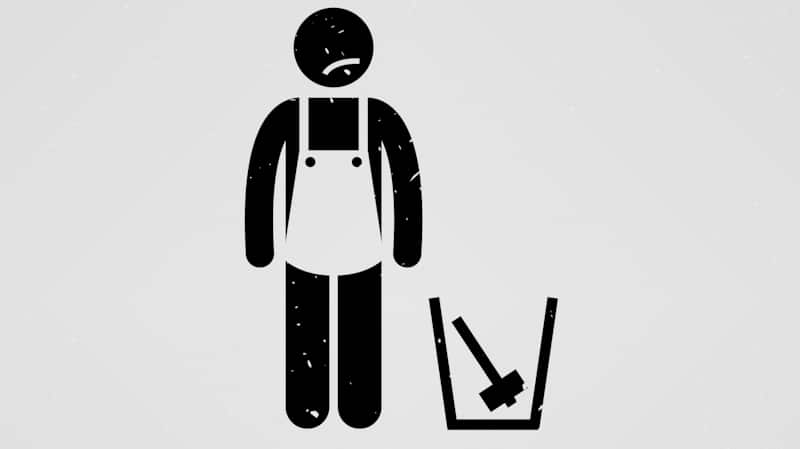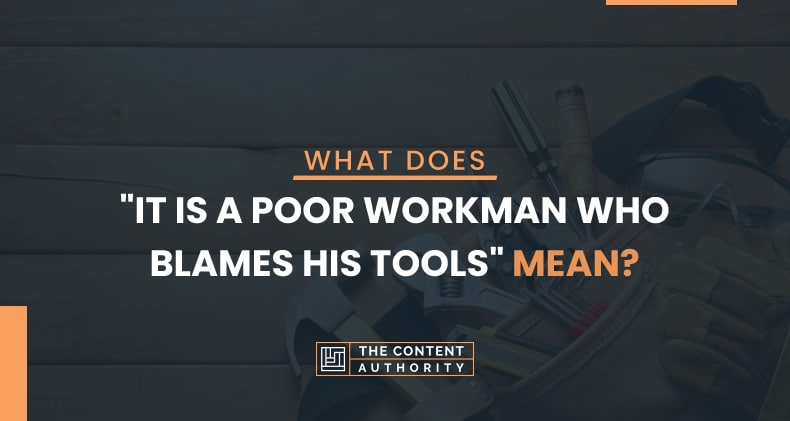There are a lot of sayings that we hear being spoken and wonder what the person is actually trying to say. One such phrase is “it is a poor workman who blames his tools.” Have you heard this phrase and found yourself wondering what it means?
The phrase “it is a poor workman who blames his tools” is used when discussing someone who has either poorly or unsuccessfully performed their job. This is especially true when the person doesn’t take responsibility for their failure but chooses to blame external issues (e.g. their tools) instead.

What the Phrase Means
“It is a poor workman who blames his tools” is a proverb that’s used throughout the world, albeit much less common than it was used 50 years ago. People will quote this proverb when they are trying to say that something isn’t of good quality. In doing so they’re saying that the bad quality occurred because the person didn’t have the correct tools to use. In reality, however, the reason the bad quality actually occurred was that the person who was doing the work didn’t have good enough skill.
When you hear this proverb you should understand that a good workman is one who’s willing to accept full responsibility for anything that went wrong. They wouldn’t try to blame someone else or the equipment they used to do the work. This means that in reality if someone does blame their poor work on the tools they used they weren’t very skilled.
When you look up this phrase in the dictionary you will find that each of the common dictionaries has a slightly different explanation for this phrase’s meaning. For instance, in the Oxford dictionary, we are told that when a person does a bad job at something they’ll try to blame their equipment instead of admitting that they weren’t skilled enough to do a good job. However, in the Cambridge dictionary, we read that this saying originated in the U.K. where it’s used whenever someone blames a failure or a mistake on the things they were using to complete a job. Dictionary.com also weighs in with a slightly different meaning saying that a persons’ success or failure isn’t determined by the tools they have available to get the job done but by how these tools are used. In other words, a good workman is someone who takes good care of their tools. This means that if a person is unskilled they’re not going to be able to do skilled work even if someone gives them the very best tools.
With all these interpretations of the saying “it is a poor workman who blames his tools,” it’s possible to get a bit confused unless you hear the phrase being used in a conversation like this:
Sarah: The cake isn’t baked well because there’s something wrong with the oven.
John: I disagree. I think it’s more of a case where a bad workman is blaming her tools.
In this example, we understand that something went wrong when Sarah baked her cake. She’s blaming the oven, which is her tool, for this mistake. However, John disagrees with this and believes that Sarah is actually an amateur when it comes to baking cakes. He uses the phrase, “it’s a poor workman who blames his tools” to express this to her.
This is also an example of how this phrase is frequently used to discuss a task that a person does, not just when discussing a person’s profession. We also see how this phrase can be reworded and yet mean the same thing (e.g. a bad carpenter blames his tools – a poor workman blames his tools). Regardless of how someone says this phrase it still means that a person doesn’t have the talent to perform a job successfully. However, they’re blaming the equipment or tools they’ve used instead of actually admitting that they didn’t have the skill required to be successful.
With this understanding of the proverb in mind, you can probably think of many instances in which someone either did a poor job or was unsuccessful at the task they were trying to perform. Instead of shouldering this blame themselves, they will blame the outcome of the situation on external factors such as the tools that they’ve used. In the past, this proverb was frequently used when someone would blame external factors such as their equipment’s quality instead of simply admitting that they did a poor job at the task at hand.
Origin of the Phrase
Now that you have a better understanding of what the proverb, “it is a poor workman who blames his tools” means you may wonder where it actually originated from. Well, a similar proverb can also be found within the French language dating back to the 13th-century. This proverb says “mauveés ovriers ne trovera ja bon hostill” When it’s translated into English it means “bad workmen will never find a good too.l” Clearly you can see how this French proverb is similar to the English one. This is why some people say that this is how the English proverb originated. It’s interesting to note that there are some other versions of this proverb found throughout the English language up until the 19th-century at which time we have the proverb as we currently know it.
You’ll also find a couple of different versions of this proverb in the British collection of proverbs that date back to the 16th-century. In these we read:
- It is not the tools we use that make us good, but rather how we employ them.
- Upon failure, it’s easier to blame the tools used rather than how they were employed.

There are many other versions of this proverb found throughout various languages over the years. These include:
- A bungler cannot find (or fit himself with) good tooles. (R. Congrave, _French-English Dictionary_, 1611)
- Never had ill workman good tooles. (G. Herbert, _Outlandish Proverbs_, 1640)
- ‘Tis an ill workman that quarrels with his own tools. (D’Urfey, tr. _Don Quixote_, 1696)
- They say an ill workman never had good tools. (J. Swift, _Polite Conversation_, 1738)
- Good workmen never quarrel with their tools. (Byron, _Don Juan_, 1818)
- It is proverbial that the bad workman never yet had a good tool. (S. Smiles, _Self-Help_, 1859)
- General Bildering . says it is only a bad workman who quarrels with his tools and repudiates Kuropatkin’s criticism of the rank and file. (_The Japan Times_, 1907)
- I’ve read somewhere that a poor workman quarrels with his tools. (J.G. Cozens, _Ask Me Tomorrow_, 1940)
- Damn! Dropped the screwdriver.. Bad workmen blame their tools. (A. Fox, _Threat Signal Red_, 1979)
Regardless of where the proverb, “it is a poor workman who blames his tools” actually originated from, it still has the same meaning: Someone has done a poor job because they weren’t qualified to do the job in the first place.
Example Sentences
Now that you know what this proverb means and some of the different ways in which it can be used, here are a few examples of sentences that’ll help you start using it yourself:
- His client was unsatisfied with their first project. He told him about the poor conditions he was working in when, in reality, it’s a case of a bad workman blaming their tools.
- Unfortunately, she slipped and fell while dancing. When she blamed it on her shoes I told her a bad workman blames their tools.
- He got angry when he was told a bad workman blames his tools.
- When my mom told my dad that the oven caused her to burn dinner my dad responded, “it’s a bad workman who blames his tools.”
- Whenever I see cheap painting tools I cringe because the old saying that a poor workman blames his tools is wrong.
- Just because a bad workman blames his tools doesn’t mean that poor tools make a bad workman.
- This is similar to a bad workman blames his tools.
- In the same way that a bad workman blames his tools, your choice of weapon and skill matters more than how good the weapon actually is.
- My father used to tell me, “A bad workman always blames his tools.”
More English Idioms
How This Phrase Functions as a Proverb
A proverb is a short sentence that’s frequently quoted by people because it gives advice. For instance, “a poor workman blames his tools” tells you that someone is making an excuse because they don’t want you to know that they aren’t qualified to do the work. While most proverbs are of unknown origin we do know where this useful adage came from. We also understand that it’s a nugget of wisdom that’s been passed down throughout the years, which is true of most proverbs.

Conclusion
“A poor workman blames his tools” is now commonplace in both our written and our spoken English language even though it doesn’t make sense literally. By taking the time to learn proverbs like this one you will have a much richer vocabulary. This is why these proverbs are still taught in schools today.
Shawn Manaher is the founder and CEO of The Content Authority. He’s one part content manager, one part writing ninja organizer, and two parts leader of top content creators. You don’t even want to know what he calls pancakes.

